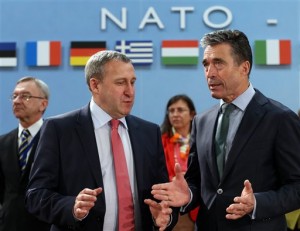NATO suspends cooperation with Russia

Ukraine’s Foreign Minister Andrii Deshchytsia, second left, speaks with NATO Secretary General Anders Fogh Rasmussen during a meeting of the NATO-Ukraine Commission at NATO headquarters in Brussels on Tuesday, April 1, 2014. NATO said Tuesday it has suspended all cooperation with Russia over the Crimea crisis and questioned Moscow’s claim to have withdrawn troops from near the Ukrainian border, saying it could not confirm any pullback. AP PHOTO/OLIVIER HOSLET
BRUSSELS—NATO said Tuesday it has suspended all cooperation with Russia over the Crimea crisis and questioned Moscow’s claim to have withdrawn troops from near the Ukrainian border, saying it could not confirm any pullback.
The Western alliance’s latest statements came as Moscow heaped even more pressure on Ukraine’s teetering economy with a painful gas-price hike, undermining what had been tentative signs of a calming in the worst East-West standoff since the Cold War.
Ukraine’s parliament met one of Moscow’s key demands by voting unanimously to disarm all self-defense groups that sprang up across the country during its political crisis, which first erupted in late November over the then-government’s decision to ditch a landmark EU alliance.
But tensions remained high more than two weeks after Moscow formally annexed Crimea, and NATO Secretary General Anders Fogh Rasmussen said the alliance was “suspending all practical cooperation with Russia, military and civilian.”
He added, however, that “diplomatic lines of communication” remained open.
Article continues after this advertisementRasmussen warned he could not confirm Russia had pulled away from the Ukrainian border.
Article continues after this advertisement“This is not what we have seen,” he said as NATO foreign ministers gathered for two days of talks, including US Secretary of State John Kerry, who flew into Brussels between shuttle diplomacy stops in the Middle East.
Ukraine and the United States have accused Russia of massing thousands of troops near the border and have expressed concern that Moscow plans to seize southeastern parts of Ukraine that are home to large populations of ethnic Russians.
German Chancellor Angela Merkel’s office said Russian President Vladimir Putin had personally informed her of the troop pullback in a telephone conversation and on Tuesday said she had “no reason” to doubt his word.
Ukraine also reported Monday that Russian troops were leaving the sensitive area, adding it appeared to coincide with a phone call that Putin had unexpectedly placed to US President Barack Obama on Friday.
With the assurances from Moscow, NATO stepped back from a floated idea to reinforce the alliance’s military presence in countries bordering Russia, preferring for now to suspend cooperation and give more time to talks.
“I think everybody realizs that the best way forward is a political and diplomatic dialogue,” Rasmussen said, though he added NATO was “very determined to provide effective defense and protection of our allies”.
One counter-measure apparently off the table for now is the idea to set up permanent military bases in NATO countries bordering Russia.
The move would be highly controversial for Moscow, reversing an informal agreement made when NATO expanded east to include former Warsaw Pact countries that were eager to break away from years of Soviet domination.
But Dutch Foreign Minister Frank Timmermans said that for now “we don’t need NATO troops at the border with Russia,” adding there was “no need for sudden moves”.
Eastern NATO members—such as the Baltic nations and Poland — want a tougher stance against Russia and would welcome a deeper NATO presence within their borders.
In a joint statement, ministers confirmed that military and civilian cooperation between NATO and Russia was suspended, but said projects in Afghanistan would remain and diplomatic channels were still open.
Rasmussen added that joint efforts to fight narcotics traffic in Afghanistan would continue.
War games
Ukraine is not a NATO member but it did form a “distinctive partnership” with the Alliance in 1997 and has been staging joint exercises with its state members ever since.
The Ukrainian parliament on Tuesday approved a new series of joint military exercises with the alliance that would put US troops in direct proximity with Russian forces in the annexed Crimea peninsula.
The exercises would partly occupy a 25-day span between July and October based around two Odessa ports and “along the waters of the Black Sea”.
Meeting a key demand posed by Russia, the parliament also voted to disarm all self-defence groups that had sprung up across the country during its political crisis.
The move came after a member of the radical Ukrainian nationalist group Pravy Sektor opened fire in central Kiev late Monday, injuring three.
Gazprom pressures Ukraine
The crisis is at an especially critical juncture in Kiev as Ukrainian politicians jockey for position ahead of May 25 presidential elections after the fall of president Viktor Yanukovych.
And with Moscow able to use gas as a lever, Gazprom chief executive Alexei Miller said Ukraine will now pay $385.5 dollars per 1,000 cubic metres of gas from the previous cut rate of $268.5.
The discount had been agreed between Yanukovych and Putin in December 2013 as a form of financial aid to the former regime.
The price hike—although widely expected—is a new blow to the Ukrainian economy, which needs an international rescue to stave off the risk of default.
To counter Moscow’s power over the energy supply throughout Europe, Polish Prime Minister Donald said Poland on Tuesday he had begun campaigning in favour of an EU energy union.
“The Ukraine context… means that the question of energy independence, not just of Poland but of the entire continent, is starting to take on an importance that extends beyond the economic factor,” said Tusk.—Alex Pigman, with Dmitry Zaks in Kiev